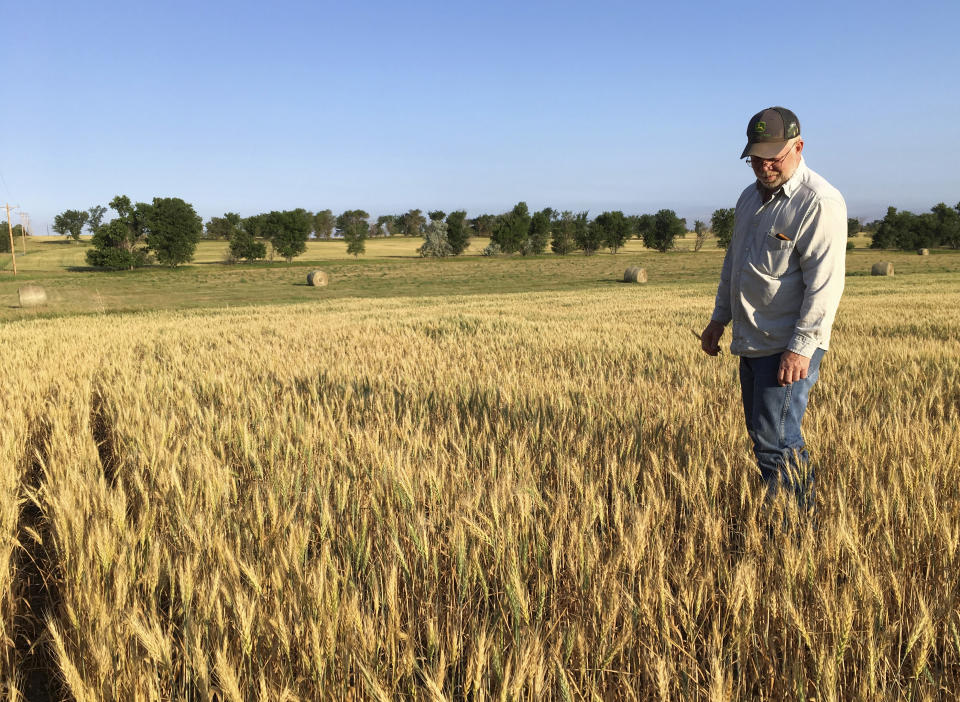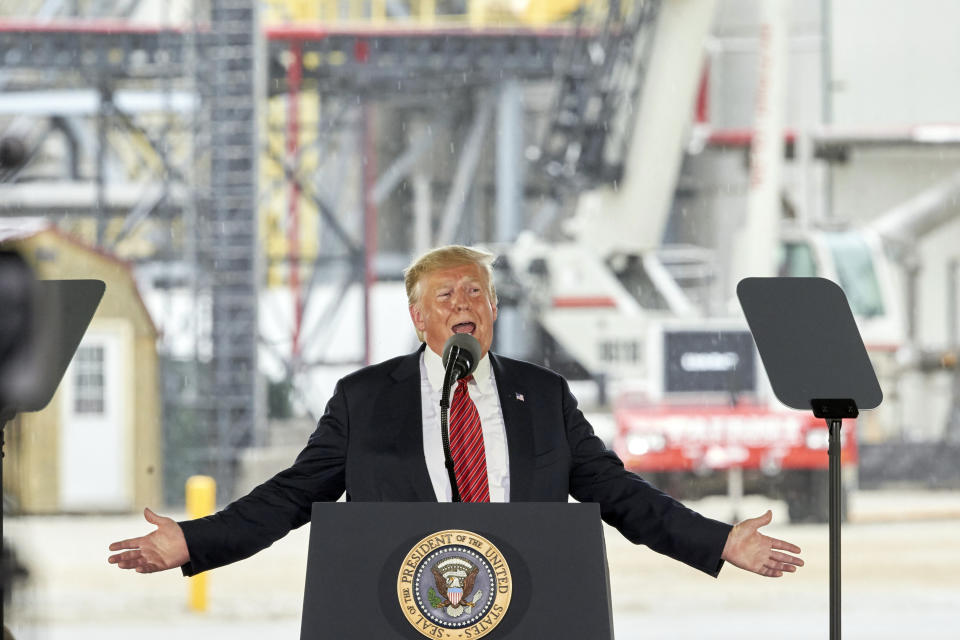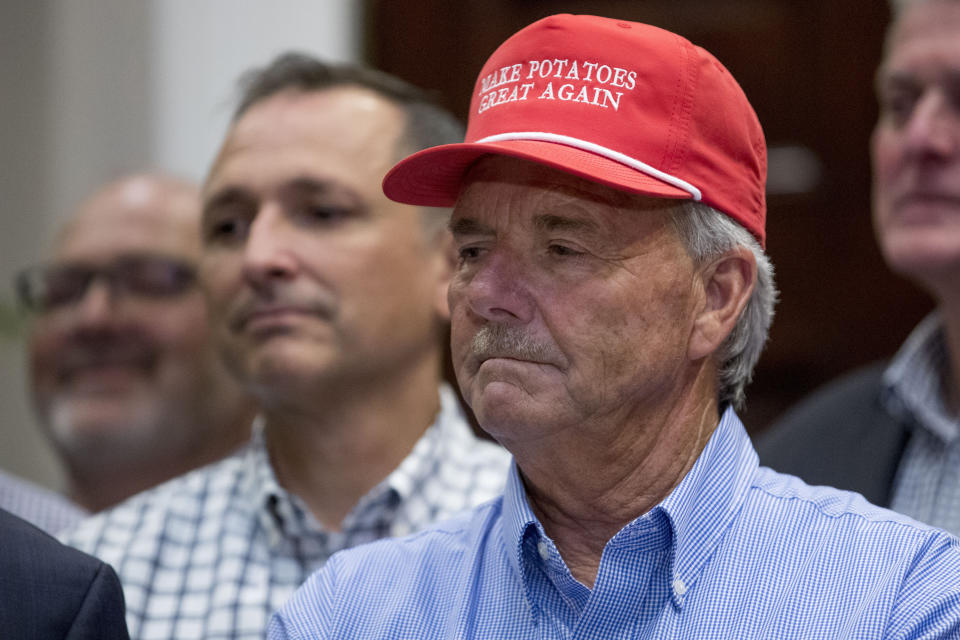American farmer: Trump 'took away all of our markets'
The White House recently announced that it would be providing an additional $16 billion in aid to American farmers affected by the trade war between the U.S. and China.
But the problem for American farmers has becomes bigger than something a bailout can fix.
“This trade thing is what’s brought on by the president and it’s really frustrating because he took away all of our markets,” Bob Kuylen, a farmer from North Dakota who grows spring wheat and sunflowers, told Yahoo Finance. “We live in an area where we’re kind of in the middle of nowhere. It costs us a lot of money — over $1 a bushel to get our grain to markets.”

‘As low as I’ve seen them in a long time’
Since trade tensions began in 2018, farmers have faced major financial challenges, since China was once a major U.S. agriculture buyer.
And losing customers has become a major issue. Soybean farmers have been dealing with this, as China has turned to other countries like Brazil for soybeans. Kuylen said this is also happening for wheat farmers, as China has begun importing wheat from Russian regions.
“All these countries went to different countries to get their grain,” Kuylen said. “How are we going to get the relations back with them to buy our grain again and be our customers?”
Between 2016-2017, China was the fourth-largest wheat buyer in the world, importing more than 61 million U.S. bushels. In 2019, the top U.S. export destinations for wheat include Mexico, the Philippines, Japan, and Nigeria — China is not even among the top 10.
“Our prices are probably as low as I’ve seen them in a long time,” he told Yahoo Finance. “We were losing just about $70 an acre just by putting our crop in [the ground] this spring.”
While a deal between the U.S. and China would take months to be reached, farmers are remaining “cautiously optimistic,” Glenn Brunkow, a Kansas-based corn and soybean farmer said.
“Our hope is that the playing field is leveled up and these tariffs on the other side are taken away,” Brunkow said. “We feel like with the technology we have, the advantages we have, we can produce the crops as economically as anyone else in the whole world.”

‘Farmers are profoundly wary of the trade war’
This isn’t the first time that the USDA has doled out aid to struggling farmers. The Trump administration pledged two installments of a farmer bailout program. The first round of payments totaling $4.7 billion was paid in September 2018, while the second round was distributed in December. By February 2019, the total aid payments reached $7.7 billion.
“Payments are a welcome help for the bottom line of Missouri farmers,” Blake Hurst, president of the Missouri Farm Bureau, told Yahoo Finance in an email statement. “Although the trade payments vary widely from county to county, they’ll keep more than a few farmers in business for another year. ...
“Having said all that,” the statement added, “farmers are profoundly wary of the trade war, embarrassed that ad hoc government subsidies are all that stands between many of us and financial ruin, and ready for the return of more normal times.”
The Wall Street Journal reported in February that farm bankruptcies in three major farm regions reached their highest level in at least 10 years. Much of this is because crop prices have been dragged down dramatically due to a decrease in consumers. Overall, U.S. farm debt soared over $409 billion in 2017, which is “the largest sum in nearly four decades and a level not seen since the 1980s,” WSJ wrote.

And it doesn’t help that farmers are facing unprecedented severe weather. Flooding has damaged crops across the Midwest. When combining that with bankruptcies, lower prices, and trade war struggles, mental health problems among rural Americans are becoming more prevalent than ever before.
“People think that farmers are just loaded with money but … just about every dollar a farmer makes, he puts back into the economy and their state and in the nation, because our inputs are so high,” Kuylen said. “We spend just about all the money we make back into the communities. If we’re struggling, everybody’s struggling.”
He added: “We kind of get a bad picture that we’re all big money and drive all this big equipment. In reality … these are record low incomes for farmers in the last couple of years. It’s getting tough out there. We’re going to start seeing a lot of suicide and a lot of farmers going out of business. So, that’s not a good thing.”
The concern is that farmers may reach a breaking point as things drag on.
“It’s going to be a scary situation if it doesn’t turn around pretty soon,” Kuylen said.
Adriana is an associate editor for Yahoo Finance. Follow her on Twitter @adrianambells.
READ MORE:
American farmers 'are in it for the long haul,' Iowa governor says about trade war
'We’re pretty helpless': American farmers react to China's latest trade war play
'Is this sustainable?’: Farmers say bailouts aren’t enough in Trump’s trade war
Read the latest financial and business news from Yahoo Finance
Follow Yahoo Finance on Twitter, Facebook, Instagram, Flipboard, SmartNews, LinkedIn, YouTube, and reddit.
